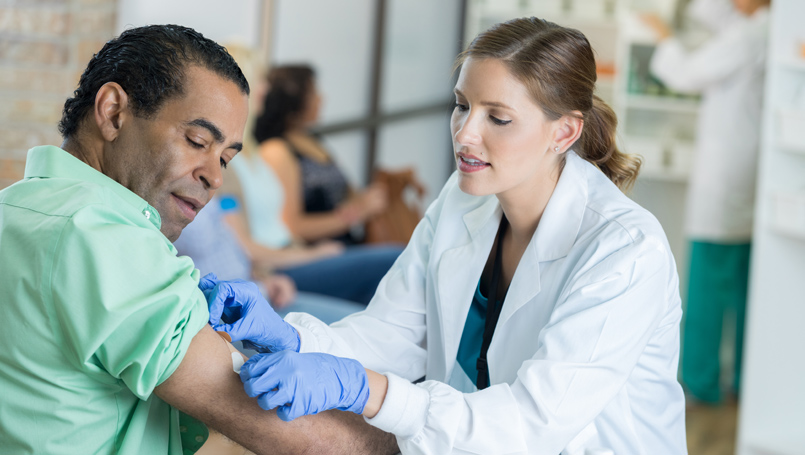
Immunizations aren’t just important for infants and children. As an adult, it is equally important to keep track of when immunizations are needed. Your primary care physician can help oversee and advise you on what's recommended.
“Adults are often under-immunized as a group in general. We are all so good about getting our kids in to get their shots, but then we so easily neglect ourselves,” said Courtney Mehock, D.O., a Beaumont family medicine physician.
“Grandparents are another target group of adults that need to make sure they are up to date on their immunizations, particularly with the Tdap vaccine. Grandmas and grandpas have a lot of love to share, but unfortunately they can unknowingly expose little ones to diseases such as pertussis. That is why it is so crucial that adults stay up to date on their immunizations,” Dr. Mehock added.
Here are general guidelines for immunizations that are recommended for some adults:
- flu shot - annually at all ages
- tetanus, diphtheria and acellular pertussis vaccination (Td/Tdap) - adults who have not receive tetanus and diphtheria toxoids and acellular pertussis vaccine (Tdap) should receive one dose of Tdap followed by a tetanus and diphtheria (Td) booster every 10 years.
- measles, mumps and rubella vaccination (MMR) - adults born in 1957 or later without acceptable evidence of immunity to measles, mumps or rubella should receive one dose of MMR vaccine unless they have a medical contraindication to the vaccine (i.e. pregnancy or several immunodeficiency).
- varicella (VAR) - adults without evidence of immunity to varicella should receive two doses of VAR. Adults who have never had chickenpox or received chickenpox vaccine should get two doses.
- herpes zoster vaccination (HZV) - adults aged 60 years or older should receive one dose of HZV, regardless of whether they had a prior episode of herpes zoster.
- human papillomavirus vaccination (HPV) - adult females through age 26 and adult males through age 21 years who have not received any HPV vaccine should receive a three-dose series.
- pneumococcal vaccination - adults who are immunocompetent and aged 65 or older may be recommended to receive doses of PCV13 and PPSV23 depending on indications and vaccines.
- hepatitis A (HepA) - adults who seek protection from hepatitis A virus infection may receive a two-dose series.
- hepatitis B (HepB) - adults who seek protection from hepatitis B virus infection may receive a three-dose series.
- meningococcal vaccination (MenACWY or MPSV4) - adults with medical conditions or other indications may receive a two-dose series.
- haemophilus influenza type b vaccination (Hib) - adults with medical conditions or other indications may receive a single dose.
- shingles vaccine - people 60 years of age and older should get the shingles vaccine.
There are guidelines for when certain immunizations should be given, but each patient should talk to his or her physician about individual needs and concerns.
Next Steps and Helpful Resources
- Learn how to expertly find a new primary care doctor.
- Learn more about getting to know your doctor before the first appointment.
- Learn what health screenings you should have for your age.
- Schedule an appointment with primary care doctor near you.

